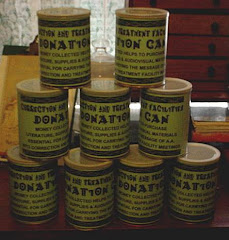Self Support – Where Spirituality and Money Mix
Twelfth Step work is the lifeblood of Alcoholics Anonymous – carrying the message to the next suffering alcoholic. Without it, the Fellowship would wither and die. Yet even at its simplest level this vital contact between one alcoholic and another involves an investment of time and money.
“Let’s begin with my own sponsor, Ebby,” writes Bill W., in the book of Alcoholics
Anonymous Comes of Age. “When Ebby heard how serious my drinking was, he
resolved to visit me. He was in New York; I was in Brooklyn. His resolve was not
enough; he had to take action and he had to spend money.
“He called me on the phone and then got into the subway; total cost, ten cents. At
the level of the telephone booth and subway turnstiles, spirituality and money began to mix. One without the other would have amounted to nothing at all.” “Right then and there, Ebby established the principle that A.A. in action calls for the sacrifice of much time and a little money.”
Another important story is this Rockefeller Story; One potential A.A. patron, however, when approached by the pioneering members for money, instead helped to lay the groundwork for A.A.’s Tradition of self-support: “I am afraid that money will spoil this thing,” said John D. Rockefeller Jr., while at the same time endorsing the work of the fledgling Fellowship.
This marked a turning point in A.A. history and, as the reality of Mr. Rockefeller’s
statement sank in and A.A. members began to see the truth in the old cliché, “Who pays the piper calls the tune,” the seed of the Seventh Tradition took root.
With the realization that A.A. must steer clear of outside contributions. In order for A.A.’s survival contributions would have to come from individual A.A. members and groups. As Bill W. put it in1957, “Our spiritual way of life is safe for future if, as a Society, we resist the temptation to receive money from the outside world. But this leaves us with a responsibility – one that every member ought to understand. We cannot skimp when the treasurer of our group passes the hat. Our groups, our areas, and A.A. as a whole will not function unless our services are sufficient and their bills are paid.
“When we meet and defeat the temptation to take large gifts, we are only being
prudent. But when we are generous with the hat we give a token that we are grateful
for our blessings and evidence that we are eager to share what we have found with all
those who still suffer.” (The Language of the Heart, p.221)
“Now, where do A.A.’s services – worldwide, area, local – fit into our scheme of
things?” asks Bill W. in an October 1967 article in the A.A. Grapevine. “Why should
we provide these functions with money?” According to Bill, “The answer is simple enough. Every single A.A. service is designed to make more and better Twelfth Step work possible, whether it be a group meeting place, a central or intergroup office … or the world service Headquarters …
“Though costly, these service agencies are absolutely essential to our continued
expansion – to our survival as a Fellowship. Their costs are a collective obligation that rests squarely upon all of us. Our support of services actually amounts to a recognition on our part that A.A. must function in full strength – and that, under our Tradition of self-support, we all are going to foot the bill.
How can groups participate?
To help support A.A.’s essential services, the General Service Office suggests that
individual groups, through an informed group conscience, adopt a specific contribution plan tailored to meet the group’s financial situation.
Once the basic group expenses have been taken care of (rent, refreshments, A.A.
literature, local meeting lists), and a “prudent reserve” has been set aside to cover any emergency contingencies that might arise, the group may decide to further carry the message by sending money to the following A.A. service entities.
The local district, which communicates directly with the groups, providing the
district group conscience for the area assemblies, and serving as a link between the
area delegates and the G.S.Rs.
The area committee, which coordinates vital A.A. activities over a broad
geographic area; sends a delegate to the annual General Service Conference, holds
area assemblies to determine the needs of the Fellowship; and provides information
at all levels of service.
The local intergroup or central office, which may provide phone service for
Twelfth Step calls and other inquiries; coordination of group activities; A.A.
literature sales; institutions work; public information and cooperation with the
professional community activities.
A.A.’s General Service Office, which functions as a storehouse of A.A.
information, communicating with members and groups around the world; publishes
A.A.’s literature; and supplies information and experience to professionals and
others interested in A.A.
Saturday, March 24, 2007
Subscribe to:
Post Comments (Atom)



No comments:
Post a Comment